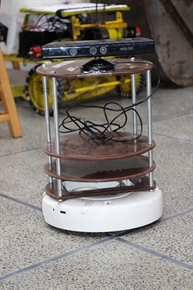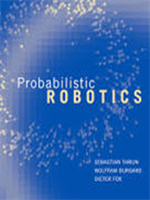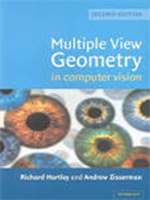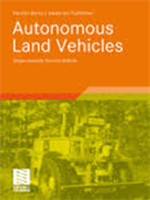Ahmad Kamal Nasir, PhD
Director engineering laboratory
Assistant professor of electrical engineering, school of science and engineering
lahore university of management sciences, pakistan
Course Description
This course is designed to provide students a hands-on experience on real aerial and ground mobile robots. It provides an overview of problems / approaches in mobile robotics. Most of the algorithms described in this course are probabilistic in nature, dealing with noisy data. The students shall be given an opportunity to implement state of the art probabilistic algorithms for mobile robot state estimation, with a strong focus on vision as the main sensor.This course is NOT about Mechatronics or robot building.

Course Learning Outcome
The students should be able to:
- Understand basic wheel robot kinematics, common mobile robot sensors and actuators knowledge.
- Understand and able to apply various robot motion and sensor models used for recursive state estimation techniques.
- Demonstrate Inertial/visual odometeric techniques for mobile robots pose calculations.
- Use and apply any one of the Simultaneous Localization and Mapping (SLAM) technique.
- Understand and apply path planning and navigation algorithms.
Course Instructor
Dr. -Ing. Ahmad Kamal Nasir
Office Hours: Tuesday[1400-1500] Thursday[1400-1500]
Room: 9-345A, EE Department, 3rd Floor, Right Wing, School of Science and Engineering
Teaching Assistant: Hamza Anwar
Office Hours: Tuesday[1400-1500] Thursday[1400-1500]
Room: 9-345A, EE Department, 3rd Floor, Right Wing, School of Science and Engineering
Teaching Assistant: Hamza Anwar
Course Details
Elective Course for Electrical Engineering and Computer Science Majors
Catagory: Graduate (5XXX level)
Semester: Spring 2017
Credits: 3
Pre-requisite (Topics/Skills): CS310 or EE361 or by permission of instructor, Programming proficiency in C/C++, linear algebra, probability
Grading Scheme: Final Project (20%), Mid-Term Examinations (25%+15%), Lab Tasks (40%)
Course Delivery Method: Lecture (Monday: 1700 - 1850), Labs (Wednesday: 1700 - 1930)
Reerence Material: The course is taught froma a combination of the following textbooks
(A) (B) (C) (D)
Lecture notes and research papers will be provided where necessary.
Catagory: Graduate (5XXX level)
Semester: Spring 2017
Credits: 3
Pre-requisite (Topics/Skills): CS310 or EE361 or by permission of instructor, Programming proficiency in C/C++, linear algebra, probability
Grading Scheme: Final Project (20%), Mid-Term Examinations (25%+15%), Lab Tasks (40%)
Course Delivery Method: Lecture (Monday: 1700 - 1850), Labs (Wednesday: 1700 - 1930)
Reerence Material: The course is taught froma a combination of the following textbooks
(A) (B) (C) (D)
Lecture notes and research papers will be provided where necessary.




Course Contents
|
Week |
Module | Topics | Reading/Reference |
|
Week 1 |
Mobile Robotics Kinematics |
Lecture: Introduction to mobile robotics and trends, course objectives Short notes on Linear Algebra 2D/3D Geometry, Transformations, 3D-2D Projections Recap of Probability Rules Tutorial: Introduction to ROS |
Lecture 1 Lab Lecture 1 Lab Task 1 |
|
Week 2 |
Mobile Robotics Kinematics |
Lecture: Wheel kinematics and robot pose calculation Differential wheel drive Ackermann wheel drive Introduction to mobile robot sensors Wheel encoders Inertial Measurement Unit (IMU) and GPS Range sensors (Ultrasonic,2D/3D Laser range scanner) Vision sensors (Monocular/Stereo camera) Introduction to mobile robot actuators DC Brush/Brushless motors PID based velocity controller PID based position controller Lab Task: ROS Interface with simulation environment |
D. Chapter 2 C. Chapter 3 Lecture 2 Lab Lecture 2 Lab Task 2 |
|
Week 3 |
Sensor Fusion and State Estimation |
Lecture: Motion Models Velocity based model (Dead-Reckoning) Odometry based model (Wheel Encoders/IMU) Sensor Models Beam model of range finders Feature based sensor models Laser scanner Kinect Camera Lab Task: ROS Interface with low level control |
A. Chapter 5 A. Chapter 6 Lecture 3 Lab Lecture 3 Lab Task 3 |
|
Week 4 |
Sensor Fusion and State Estimation |
Lecture: Recursive State Estimation: Bayes Filter Linear Kalman Filter Extended Kalman Filter Lab Task: IRobot setup with ROS and implement odometeric motion model |
A. Chapter 3 Lecture 4 Lab Lecture 4 Lab Task 4 |
|
Week 5 |
Sensor Fusion and State Estimation |
Lecture: Non-parametric filters Histogram filters Particle filters Lab Task: AR Drone setup with ROS and sensor data fusion using AR Drone's accelerometer and gyroscope |
Lecture 5 Lab Lecture 5 Lab Task 5 |
|
Week 6 |
Inertial and Visual Odometry |
Lecture: Inertial sensors models Gyroscope Accelerometer Magnetometer GPS Inertial Odometry Mid-Term Examination 1 |
Lecture 6 |
|
Week 7 |
Inertial and Visual Odometry |
Lecture: Visual Odometry: Camera model, calibration Feature detection: Harris corners, SIFT/SURF etc. Kanade-Lucas-Tomasi Tracker (Optical Flow) Lab Task: Inertial Odometry using AR Drone's IMU and calculating measurement's covariance |
C. Chapter 4 B. Chapter 6 B. Chapter 9 Lecture 7 Lab Lecture 6 Lab Task 6 |
|
Week 8 |
Inertial and Visual Odometry |
Lecture: Epi-polar geometry for multi-view Camera motion estimation Structure From Motion (SFM): Environment mapping (Structure), Robot/Camera pose estimation (Motion) Lab Task: Calibrate AR Drone's camera and perform online optical flow. |
B. Chapter 10 B. Chapter 11 Lecture 8 Lab Lecture 7 Lab Task 7 |
|
Week 9 |
Localization and Mapping |
Lecture: Natural, Artificial and GPS based localization Kalman Filter based localization Optical flow based localization Lab Task: Using AR Drone’s camera, perform visual odometry by SFM algorithm |
C. Chapter 5 Lecture 9 Lab Lecture 8 Lab Task 8 |
|
Week 10 |
Localization and Mapping |
Lecture: Mapping Feature mapping Grid Mapping Introduction to SLAM Feature/Landmark SLAM Grid Mapping (GMapping) Mid-Term Examination 2 |
A. Chapter 09 A. Chapter 10 Lecture 10 |
|
Week 11 |
Localization and Mapping |
Lecture: RGBD SLAM Lab Task: Creating grid map using IRobot-Create equipped with laser scanner. |
Lecture 11 Lab Lecture 9 Lab Task 9 |
|
Week 12 |
Navigation and Path Planning |
Lecture: Obstacle avoidance: configuration/work spaces, Bug Algorithm Path Planning algorithms: Dijkstra, Greedy First, A* Lab Task: Create a 3D grid map using IRobot equipped with Microsoft Kinect. |
C. Chapter 06 Lecture 12 Lab Lecture 10 Lab Task 10 |
|
Week 13 |
Navigation and Path Planning |
Lecture: Exploration, Roadmaps Lab Task: Setup and perform navigation using ROS navigation stack and stored map |
Lecture 13 Lab Lecture 11 Lab Task 11 |
|
Week 14 |
Navigation and Path Planning |
Lecture: Recap, Recent research works and future directions Guest Lecture by Dr. Haider Ali. (DLR Germany) Lab Task: Hands-on introduction to sampling based planners via Open Motion Planning Library (OMPL) |
Lecture 14 Lab Lecture 12 Lab Task 12 |
|
Week 15 |
Final Presentations |
|



